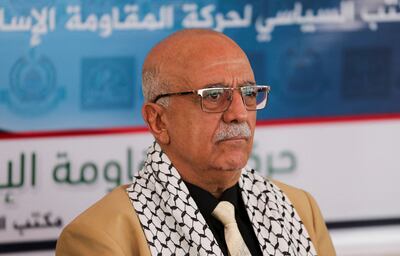Yemen’s Houthi rebels said on Saturday that their Prime Minister Ahmed Ghaleb Al Rahwi and several government ministers had been killed in an attack on Sanaa by Israel on Thursday.
The Israeli military said on Thursday that it “precisely struck a Houthi terrorist regime military target in the area of Sanaa in Yemen”.
On Friday, Israel's army radio said the strikes on the rebel-held capital had targeted the Houthis' chief of staff and defence minister and it was awaiting confirmation of the outcome.
The Houthis vowed to avenge the deaths. We promise to God, to the dear Yemeni people and the families of the martyrs and wounded that we will take revenge," the head of the group's supreme political council, Mehdi Al Mashat, said in a video message posted on Telegram.
He warned foreign companies to leave Israel "before it's too late".
Members of the Iran-backed militia initially denied reports that its leadership had been hit, but on Saturday issued a statement confirming the deaths of senior regime figures.
They said Mr Al Rahwi, who was appointed last year, “along with a number of ministers” had been killed in the attack by the “criminal and treacherous Israeli enemy” which targeted them during a government workshop. Mr Al Rahwi's deputy, Mohamed Moftah, was assigned on Saturday to carry out the prime minister's duties.
The group reiterated its support for the Palestinian people, and said public services will not be affected.
“Institutions will continue to provide services to the struggling, patient and steadfast Yemeni people, and they will not be affected, no matter the extent of the disaster,” the Houthi statement said.
The Houthis began firing on Israel shortly after the beginning of the war in Gaza and have also attacked shipping in the Red Sea, causing major disruption. Their attacks have continued and Israel responded earlier in the week and again on Thursday by targeting leadership figures.
Earlier on Saturday the Houthi military chief of staff Mohammad Al Ghamari vowed retaliation for Israel's attacks on Sanaa. He said the Houthis will not stop their support for Gaza, "regardless of the scale of targeting or sacrifices required".
"The Zionist escalation in Gaza or against Yemen is not a sign of strength but rather evidence of the enemy's failure to achieve its objectives over the past two years," his statement read.
Milestones on the road to union
1970
October 26: Bahrain withdraws from a proposal to create a federation of nine with the seven Trucial States and Qatar.
December: Ahmed Al Suwaidi visits New York to discuss potential UN membership.
1971
March 1: Alex Douglas Hume, Conservative foreign secretary confirms that Britain will leave the Gulf and “strongly supports” the creation of a Union of Arab Emirates.
July 12: Historic meeting at which Sheikh Zayed and Sheikh Rashid make a binding agreement to create what will become the UAE.
July 18: It is announced that the UAE will be formed from six emirates, with a proposed constitution signed. RAK is not yet part of the agreement.
August 6: The fifth anniversary of Sheikh Zayed becoming Ruler of Abu Dhabi, with official celebrations deferred until later in the year.
August 15: Bahrain becomes independent.
September 3: Qatar becomes independent.
November 23-25: Meeting with Sheikh Zayed and Sheikh Rashid and senior British officials to fix December 2 as date of creation of the UAE.
November 29: At 5.30pm Iranian forces seize the Greater and Lesser Tunbs by force.
November 30: Despite a power sharing agreement, Tehran takes full control of Abu Musa.
November 31: UK officials visit all six participating Emirates to formally end the Trucial States treaties
December 2: 11am, Dubai. New Supreme Council formally elects Sheikh Zayed as President. Treaty of Friendship signed with the UK. 11.30am. Flag raising ceremony at Union House and Al Manhal Palace in Abu Dhabi witnessed by Sheikh Khalifa, then Crown Prince of Abu Dhabi.
December 6: Arab League formally admits the UAE. The first British Ambassador presents his credentials to Sheikh Zayed.
December 9: UAE joins the United Nations.
COMPANY%20PROFILE
%3Cp%3E%3Cstrong%3ECompany%20name%3A%3C%2Fstrong%3E%20Revibe%20%0D%3Cbr%3E%3Cstrong%3EStarted%3A%3C%2Fstrong%3E%202022%0D%3Cbr%3E%3Cstrong%3EFounders%3A%3C%2Fstrong%3E%20Hamza%20Iraqui%20and%20Abdessamad%20Ben%20Zakour%20%0D%3Cbr%3E%3Cstrong%3EBased%3A%3C%2Fstrong%3E%20UAE%20%0D%3Cbr%3E%3Cstrong%3EIndustry%3A%3C%2Fstrong%3E%20Refurbished%20electronics%20%0D%3Cbr%3E%3Cstrong%3EFunds%20raised%20so%20far%3A%3C%2Fstrong%3E%20%2410m%20%0D%3Cbr%3E%3Cstrong%3EInvestors%3A%20%3C%2Fstrong%3EFlat6Labs%2C%20Resonance%20and%20various%20others%0D%3C%2Fp%3E%0A
Labour dispute
The insured employee may still file an ILOE claim even if a labour dispute is ongoing post termination, but the insurer may suspend or reject payment, until the courts resolve the dispute, especially if the reason for termination is contested. The outcome of the labour court proceedings can directly affect eligibility.
- Abdullah Ishnaneh, Partner, BSA Law


